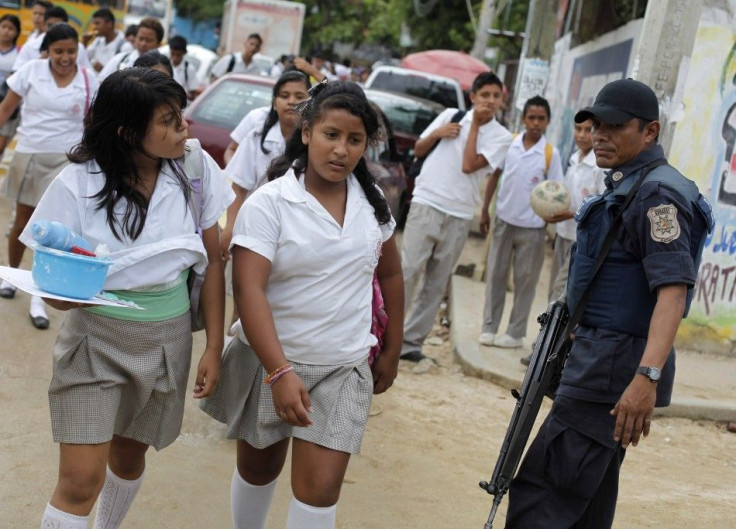Are Mexico's Drug Cartels Recruiting American Children?

In the ongoing drug war in Mexico, cartels will do whatever they can to gain more power, even if that means recruiting teenage soldiers.
Drug gangs have been known to employ children as young as 11 years old, some of whom come from Texas, California and other U.S. states. Powerful cartels often have a presence inside the U.S., where they sell drugs brought in from Central America, and now at least six of these cartels are actively recruiting [American] childen, according to a Reuters report.
The Texas children purportedly involved with Mexican cartels have a number of different roles inside the gang. Some are simply paid to move cars back and forth to distract police, while others are used to traffic narcotics.
Using children and teenagers for drug slinging is not a new practice, nor is it unique to Mexico. In Berlin, Germany, a 12-year-old boy was arrested for selling heroin, and in England, hundreds of kids below sixteen years old are arrested for their involvement with drug gangs each year.
“They don’t usually deal themselves but are used by adult dealers as pushers because they are under the age of criminal responsibility. The kids will get paid pocket money in return, Kerstin Dettmer, from Berlin's drug advice center, told German magazine Bild.
“Drugs are a scourge of our broken society that wreck lives, destroy communities and undermine all other efforts to combat all other types of crime, shadow home secretary Dominic Grieve told The Telegraph in 2008. What kind of future are we setting our young people up for when we are allowing them to become both victims and perpetrators of such serious crime at such a young age?”
There are significantly more young Mexican natives involved with these cartels than there are Americans. A cartel called Los Zetas is said to employ and train a number of teenaged assassins, and earlier this year, Mexican police caught two 16-year-old girls and a 13-year-old girl who admitted to being hit-women.
Recruiting is not always the right word for what happens in Mexico. While some teenagers are certainly seeking the lawless fortunes found in the drug trade, others are allegedly being forced into working for cartels.
In July, a 14 year-old San Diego boy named Edgar Jimenez Lugo was convicted of murder, kidnapping and torture. Nicknamed El Ponchis, Jimenez was found guilty of beheading four people for the South Pacific cartel. The boy told police that the gang kidnapped him and his sister and forced him to do drugs and to torture the cartel's enemies.
Despite that, the problem is not as serious as The New American's James Heiser thinks it is. Heiser claims that cartels are infiltrating Texas schools, where teachers are making American children pledge allegiance to Mexico, presumably making them sympathetic to the violent traffickers sending narcotics across the border.
While that's probably an exaggeration, these cartels are actually developing relationships with schools domestically, but in a much different way. In Acapulco, cartels are using extortion to try to rob teachers of their salaries. A number of severed heads, thought to be warnings, have been found outside of local schools in the city.
In the state of Guerrero, governor Angel Aguirre has promised to increase police patrols around schools, as well as install security cameras and panic buttons in classrooms, according to The Telegraph. A number of schools have remained closed for weeks for fear that cartels will attack students and teachers if they aren't paid protection money.
These tactics are spreading around Mexico, and in the city of Santiago in the state of Nuevo Leon, a series of threatening banners were posted in schools. On a few occasions, armed men entered into schools to deliver threats in person.
We're treating the threats very seriously. Because of our location, there could be multiple hidden cells of criminal organizations. We have increased the presence of security forces and we believe the banners are retaliation for that, Gustavo Duncan, spokesman for the Santiago mayor's office, told CNN.
Santiago sits near the Texas border, on a useful drug trafficking route currently being fought over by gangs Los Zetas and the Gulf cartel. It is less than 20 miles from Monterrey, the cite of a Zetas-led casino arson that killed more than 50 people.
Mexico has been fighting a war on drugs for the past five years, and under President Felipe Calderon's administration the war has has more than 43,000 casualties.
© Copyright IBTimes 2024. All rights reserved.











